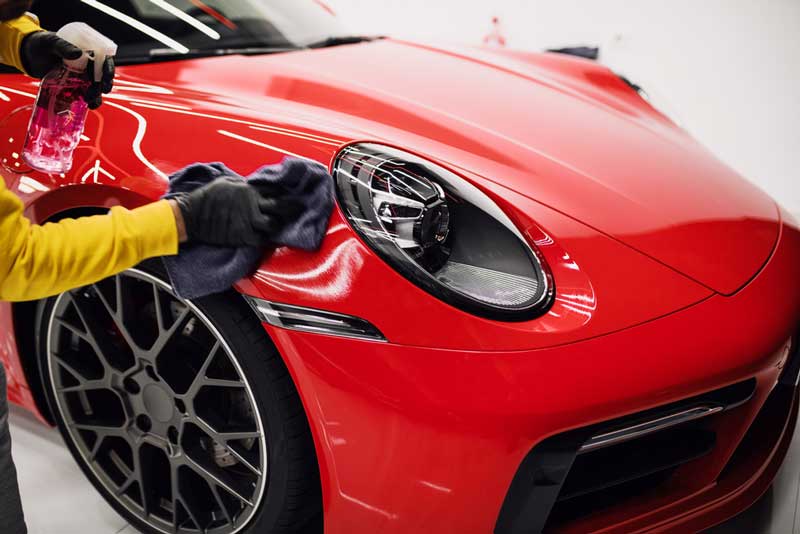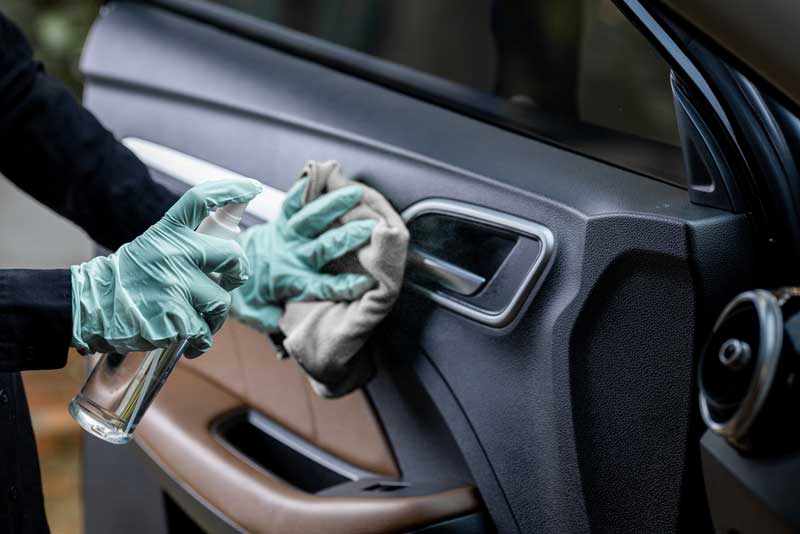When was the last time you cleaned your vehicle with a wiping agent? There are various cleaning products but would vinegar on car paint be effective and without repercussions?
If you are in this state and want to make a decision, or maybe, you have other related questions, then you are on the right page.
Vinegar is one of the most popular cleaning products in the home. It has various uses, particularly for eradicating difficult stains. It’s a valuable element for cleaning your car’s interior and upholstery. But it is not advisable to use Vinegar when cleaning the outside of your car because it would affect your paint.
This is due to Vinegar’s high acidity, even when diluted. When cleaning the exterior of your automobile, acidic cleaners should be avoided because they degrade car paint. For treating the exterior of your car, clay or wax are preferable options.
In this article, we will discuss how vinegar affects paint, its best use in a car, and some other vinegar substitutes.
Can You Use Vinegar On Car Paint?
As a substance, Vinegar is not too strong or corrosive enough to cause paint damage, and you can reduce any risk by using a sponge or cloth wet with vinegar on the glass. You don’t spray the whole car or leave it on the surface for a long period.
What is Vinegar?
Trace compounds and Acetic acid, such as flavorings, are combined to form Vinegar, an aqueous solution.
Typically, Acetobacter bacteria ferment ethanol or carbohydrates to generate acetic acid.
Depending on the raw components, many different forms of Vinegar are accessible. Additionally, Vinegar is frequently advertised as a highly efficient cleaning agent for use in residential surroundings.
Does Vinegar Ruin Auto Paint?
Naturally, you want your car’s exterior and interior to be free from spots. Do you think it is acceptable to have your automobile washed with Vinegar? Wouldn’t the same do-it-yourself strategy be used for your car’s interior work for the exterior too?
There are better ideas than using Vinegar on your car’s paint.
Acetic acid is a substance commonly found in Vinegar, and that can be created through fermentation or other methods (for example, it is used for production).
When diluted, it can ease sore throats, clean glass, and remove ink or hair dye marks.
But then, does it affect the paint of cars in any way? The answer is not really. Vinegar can occasionally remove the wax coating, although it is not likely to have a substantial effect on most finishes.
This doesn’t imply that white Vinegar should be poured on your automobile for corrosive or cleaning reasons. You should take excessive precautions when using a vinegar solution that has been diluted when cleaning your car.
The form of paint your car has can affect how efficiently it can handle Vinegar as a cleansing solution, so it’s important to keep that in mind.
For instance, it is best to avoid using Vinegar as a cleaning solution on vehicles with finishes that are more prone to damage, such as acrylics, lacquers, or enamels.
If not, the worst that can happen to your car’s paint is for a bulk of it to wear off gradually (just like any other abrasive cleaner). Although this would only last for a while, you may need to give it time for small renovations after Vinegar has been used on your automobile.
In the end, there isn’t much risk involved in utilizing diluted vinegar solutions, but it’s still not a good idea to apply them on your car for anything other than cleaning.
However, there shouldn’t be any concerns regarding harm to the car if you decide to utilize a method like that as a vital part of the routine maintenance procedure or only periodically out of accessibility.
Try using water and a few drops of dish soap dissolved in it as a secure substitute.
Also Read: What is TLC For Cars?
Can One Use Vinegar To Clean a Car?
Mix white Vinegar and water solution, then use a clean towel to clean the plastic, wood surfaces, and vinyl inside your car. You can use a bit of that cleaner on any vinyl surface (like the dashboard), wood, or plastic.
What is the Effect of Vinegar to a Car?
Because Vinegar is an acidic liquid, it can break down dirt and grime on your car’s surface and clean and sanitize surfaces. It also facilitates the breakdown of hard wax and oil.
It’s a risk-free, natural cleaning agent for various domestic applications. It can be used as frequently or infrequently as you like on the exterior of your car without endangering it.
Because it can remove magnesium deposits and calcium, white Vinegar is very effective at eliminating hard water stains. However, we advise waiting to do this until your car has been washed and dried.
The most crucial thing when using white Vinegar for the care of the car exterior is to ensure that it has been sufficiently diluted to avoid changing the protective layer of the paint.
Once it has been diluted, please put it in your sprinkler bottle and use a tidy microfiber towel to cleanse your car.

How Can I Use Vinegar to Clean my Car’s Exterior?
It’s okay to use white Vinegar that is distilled on automotive paint. When used sparingly, it won’t harm your car’s clear finish or color. It can be used to clean the surface of your automobile of water spots, trees, tar, and bugs. Before applying Vinegar to your car, be sure to dilute it with water.
- Combine vinegar and water in an equal ratio in a deep bowl.
- Use the mixture to wet a washcloth or sponge before cleaning your automobile. Don’t scrub too vigorously because doing so could harm the paint.
- Wipe below your car’s exterior, wash it with soapy water, then rinse it thoroughly.
- Dry your automobile with a fresh towel to avoid water stains.
Why Does Vinegar Deface Paint?
White Vinegar, which has a 2.5 pH level, is proudly the most frequently used Vinegar for household cleaning, but more people are starting to use it for cleaning automobiles.
The paint on your car could corrode or burn if you spray Vinegar on it in a strong stream. Remember that Vinegar can ruin the paint of your car.
Despite not being highly corrosive, Vinegar can damage your automobile’s paint if you spray it on the car. It’s not worth the risk if you want your car sparkling and clean unless you’re willing to take the chance of imprinting your paint.
The adverse effects will be compounded if you sprinkle Vinegar on your car and then take it out under the sun for a long time. The extra heat quickens the imprinting process.
How Best Can Vinegar be Used on My Car?
Can you wash your automobile using hose water? Is it challenging to clean up the dried water marks later? There are several disadvantages to hard water like this. It doesn’t readily create lather and usually leaves irritant spots that are pretty challenging to remove.
The most straightforward technique to stop this is to switch to soft texture water. There is a way around it for people who use hard texture water.
If Vinegar is sprayed on paint and then gently scraped off with a microfiber cloth, it can remove magnesium deposits and calcium left out by hard texture water in this particular situation. After this, your car will be clean and free from white spots.
Vinegar is effective at removing stains caused by hard water, but remember that it tends to be difficult to paint your car after that. And for many people who own cars, this is a serious problem.
Whatever the case, adding water significantly reduces the acidity of Vinegar. And doesn’t stop it from effectively removing stains.
What to Do if My Car Was Damaged by Vinegar?
Don’t be too hard on yourself if you’ve been using Vinegar and have found etch marks or dimples. This form of damage can be repaired by painting or polishing. Polishing is easy to do and can be done at home.
- Use auto shampoo to clean your vehicle completely, then rinse it thoroughly with cool water. After that, leave your car parked to allow the exterior to dry.
- Buff the damaged region. Do this cautiously since the rubbing compound contains a cutting ingredient that can remove paint. This refers to applying the chemical in brief, tiny circular motions till the surface becomes shiny.
- Remove any remaining compound with a damp cloth before using a buffing/ polishing pad and an auto polisher.
- Rub the buffer in round motions after dabbing a very small quantity of polish onto the pad. Swirl marks, if any, will be removed by the polish, which also creates a glossy layer.
- Apply the automotive wax after polishing the afflicted region. Because polishing creates tiny pores, you need to seal the surface with wax.
Also Read: How to Clean a Carburetor Without Removing It
Frequently Asked Questions – Vinegar On Car Paint
Is Vinegar harmful to car paint?
The paint on your car could corrode or even burn if you spray Vinegar in a strong stream. Remember that Vinegar can ruin the paint of your car. Despite not being highly corrosive, Vinegar can indeed damage the paint on your automobile if you spray it on your car.
Can I have Vinegar spray on my car?
Pour the water and Vinegar mixture into a sprinkler bottle in a 1:3 ratio. Spray the car’s exterior, then use newspaper to dab it dry. The result will be a streak-free, spotless automobile.
Will Vinegar damage painted surfaces?
Vinegar is neither corrosive nor strong enough to destroy paint, so you may reduce the danger by wiping the glass with a sponge or cloth dampened with Vinegar rather than spraying the entire car with vinegar or letting it sit on the top for a long time.
Can I use Vinegar to clean my car paint?
It is not advisable to use Vinegar on automotive paint. The clear coat side of the car’s paint over time may become damaged by the Vinegar’s acidic nature, dulling its appearance. Additionally, if Vinegar is used to hand wash a car, it won’t provide the exact lubrication as a rapid detailer or car shampoo, which will likely result in scratches.
How does Vinegar remove car stains?
Step one, combine two parts of distilled water and one part of white Vinegar inside a big basin to make your cleaning solution. Step two, Pour the mixture into a sprinkler bottle to complete the application process easier. Step three, Sprinkle the mixture on the spots caused by hard water.
How do I get dried water spots off my car?
One part normal white vinegar and one part distilled water should be combined (soft water will suffice too). Avoid using conventional tap water because it contains minerals. Using a sprinkle bottle, saturate the harmed paint finish with the vinegar/water mixture, then leave it for about ten minutes for the mixture to work.
Conclusion – Vinegar On Car Paint
Although Vinegar can be used to clean your car, it has thus far been associated with imprinting and overuse, which can harm your paint. Use it cautiously and dissolve it with three parts of water to reduce the possibility of damage. Many vinegar substitutes offer comparable advantages without harming your car’s paint. It is preferable to use clay, wax, a car wash product, or a mix of all three to clean your automobile. This way, you can avoid worrying about paint deterioration.

